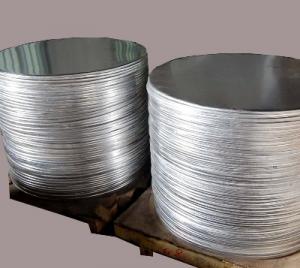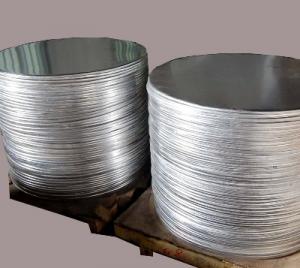Continuous Casting Mill Finished Aluminium Circle for Cookware
- Loading Port:
- Shanghai
- Payment Terms:
- TT or LC
- Min Order Qty:
- 2 m.t.
- Supply Capability:
- 5000 m.t./month
OKorder Service Pledge
OKorder Financial Service
You Might Also Like
1.Structure of Continuous Casting Mill Finished Aluminium Circle for Cookware
Continuous Casting Mill Finished Aluminium Circle for Cookware is one semi-finished aluminium material. This strip can be rolled down to aluminium coil,sheet,circle ect. The alloy AA1050 is widly used in building, industry ect. Its weight is much lower than steel. So many customers choosed aluminium material instead of steel.
2. Main features of Continuous Casting Mill Finished Aluminium Circle for Cookware
a.Competitive price---We have our own mills and can produce mill finished aluminium coils, so we can control the production cost better.
b.Professional after-sale service---We have more than 15 years exportation experience and you need not worry about the exporation problems.
c.Fast delivery time---We can control the delivery time within 35 days.
3. Image
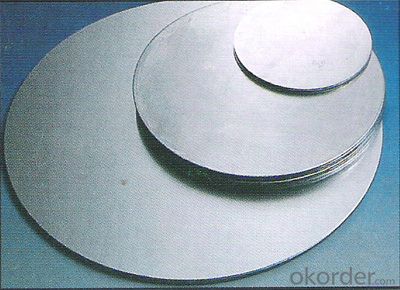
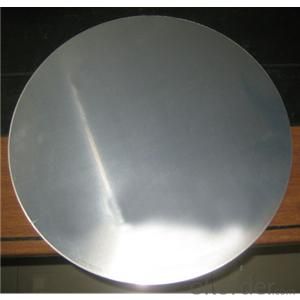
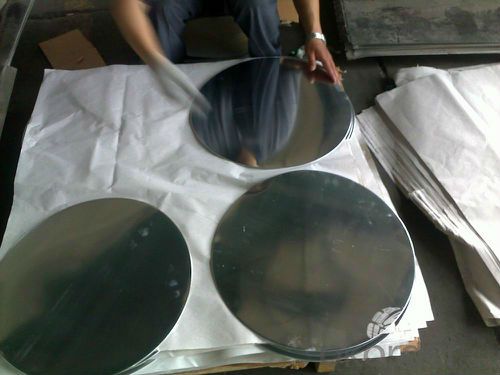
4. Product Specification
| Alloy | Temper | Thickness | Diameter | Weight |
| AA1050 | H18 | 0.2MM-3MM | 100MM-1000MM | 2 TONS |
5.FAQ:
What is the quality standard?
---Usually our standard is GB3880-2006
What is the largest width?
---It is 2300mm
What is the MOQ?
---Usually we can accept 80 tons.
- Q:How do aluminum coils compare to steel coils?
- Aluminum coils and steel coils have distinct characteristics that set them apart in terms of strength, weight, corrosion resistance, and cost. In terms of strength, steel coils generally have a higher tensile strength than aluminum coils. This means that steel coils can withstand greater stress and pressure without deforming or breaking. However, aluminum coils still possess sufficient strength for many applications and can be reinforced or designed for specific purposes. Weight is a significant factor when comparing aluminum and steel coils. Aluminum is a lightweight metal, approximately one-third the weight of steel. This lightweight property makes aluminum coils more advantageous in applications where weight reduction is critical, such as in transportation industries or aerospace. When it comes to corrosion resistance, aluminum coils outperform steel coils. Aluminum naturally forms a protective oxide layer that prevents further corrosion. On the other hand, steel is susceptible to rust and requires additional coating or treatment to enhance its corrosion resistance. This makes aluminum coils a preferred choice in coastal or humid environments where corrosion can be a major concern. Cost is another key consideration. Aluminum coils often have a higher initial cost than steel coils due to the higher cost of raw materials and manufacturing processes. However, the overall cost may vary depending on factors like transportation, maintenance, and lifespan. Aluminum coils tend to have lower maintenance costs and longer lifespans due to their corrosion resistance, which can offset the initial investment in the long run. In summary, aluminum coils offer several advantages over steel coils, including lower weight, superior corrosion resistance, and potential long-term cost savings. However, steel coils still boast higher tensile strength and may be the preferred choice in applications that require maximum strength or have a lower budget. Ultimately, the choice between aluminum and steel coils depends on the specific requirements and considerations of the intended application.
- Q:What is the expected lead time for manufacturing aluminum coils?
- The lead time for manufacturing aluminum coils can vary depending on several factors, such as the complexity of the coil design, the size and quantity of the coils being manufactured, the availability of raw materials, and the production capacity of the manufacturing facility. Generally, the lead time for aluminum coil manufacturing can range from a few weeks to several months. If the coils have a simple design and readily available raw materials, the lead time is usually shorter. However, if the coils have a complex design or require specialized materials, the lead time may be longer. Additionally, the production capacity of the manufacturing facility is a significant factor in determining the lead time. Facilities with higher production capacities can manufacture and deliver aluminum coils more quickly than those with lower capacities. To obtain an accurate estimate of the expected lead time, it is important to consult with the specific manufacturer. They will assess the project's specific requirements and provide a timeframe that aligns with those requirements.
- Q:Are there any health concerns associated with aluminum coils?
- There are some health concerns associated with aluminum coils, but they are generally considered to be minimal. Aluminum coils are commonly used in HVAC systems and refrigerators, and there have been some concerns regarding potential health risks related to the release of aluminum particles into the air or food. However, studies have shown that the amount of aluminum released from these coils is typically very low and does not pose significant health risks. While aluminum is a known neurotoxin, the levels of aluminum exposure from aluminum coils are generally well below the threshold that could cause harm. The World Health Organization (WHO) has set a provisional tolerable weekly intake for aluminum, and the amount typically released from aluminum coils is significantly below this level. It is important to note that individuals with certain health conditions, such as kidney disease or aluminum sensitivity, may be more susceptible to the potential health effects of aluminum exposure. In such cases, it is advisable to consult with a healthcare professional or an HVAC specialist to determine the best course of action. Overall, while there are some health concerns associated with aluminum coils, they are generally considered to be minimal and unlikely to pose significant risks to the general population. Regular maintenance and proper installation of HVAC systems can help minimize any potential risks and ensure the safe and efficient operation of aluminum coils.
- Q:Aluminum is a transition metal, woudn't the stock naming system apply to this formula?
- Aluminium has only one oxidation state i.e +3. Hence it does not matter whether we call it aluminium (iii) oxide or simply aluminium oxide. However copmare iron oxide. Here it could be FeO or Fe2O3 so we have to distinguish by indicating Iron (II) Oxide for FeO and Iron (III) oxide for Fe2O3.
- Q:Can aluminum coils be used in the manufacturing of electronic devices?
- Electronic devices can utilize aluminum coils due to their versatile nature and widespread use in various industries, including electronics. Transformers, inductors, and other components of electronic devices often incorporate aluminum coils. The lightweight nature of aluminum coils is one of their major benefits in electronic devices. Compared to materials like copper, aluminum is significantly lighter, making it easier to handle and transport. Moreover, aluminum possesses excellent thermal conductivity, promoting efficient heat dissipation within electronic devices. In addition, aluminum coils exhibit resistance to corrosion, which is vital in electronic applications where exposure to moisture or harsh environments is likely. This corrosion resistance plays a crucial role in extending the lifespan of electronic devices and ensuring their reliability. Furthermore, aluminum coils can be easily shaped and sized to fit various electronic device designs. This flexibility allows for customization to meet specific requirements, such as fitting into compact spaces or achieving desired electrical characteristics. In summary, aluminum coils offer numerous advantages in the manufacturing of electronic devices, including their lightweight nature, good thermal conductivity, resistance to corrosion, and flexibility in design.
- Q:How do aluminum coils contribute to lightweight construction?
- Due to its properties as a metal, aluminum plays a crucial role in lightweight construction. Its low density sets it apart from other metals like steel or copper, making it significantly lighter. When formed into coils, aluminum increases its surface area, resulting in more efficient heat transfer and distribution. The utilization of aluminum coils in various industries such as automotive, aerospace, and construction leads to a notable reduction in overall weight. This reduction offers several advantages, including enhanced fuel efficiency in vehicles, increased payload capacity in aircraft, and easier handling and installation in construction projects. Furthermore, the lightweight nature of aluminum coils enables designers and engineers to develop more innovative and energy-efficient designs. With less weight to support, thinner and lighter materials can be used for other components, resulting in additional weight savings. This not only saves costs during manufacturing and transportation but also reduces environmental impact. Moreover, aluminum coils possess excellent corrosion resistance, making them ideal for outdoor applications. Their ability to resist rust and corrosion adds to their durability and longevity, ensuring that lightweight structures made with aluminum coils can withstand harsh environmental conditions. In conclusion, aluminum coils contribute significantly to lightweight construction by providing a durable and lightweight material. This enables designers and engineers to create more efficient and sustainable structures, vehicles, and products. The use of aluminum coils not only reduces the weight of the overall construction but also offers benefits such as improved fuel efficiency, increased payload capacity, and cost savings.
- Q:i have some questions about aluminum can recycling??:how much can you get from doing that??where can i take them in indianapolis, in???and what else could i recycle??its good for the earth and i need some money!! :) :D thanks!!! :)
- Aluminum is not biodegradable. Also making aluminum from ore requires a lot of energy. Recycling cans is easy and saves a whole lot of energy reducing green house gases. Recycling aluminum also reduces the mining required to dig up aluminum ore thereby saving the land and stopping pollution from mine run-off.
- Q:Are aluminum coils resistant to fire?
- Yes, aluminum coils are generally considered to be resistant to fire. Aluminum has a high melting point of 660 degrees Celsius, which is significantly higher than the average temperature of most household fires. This makes aluminum coils a popular choice for various applications where fire resistance is required, such as in the construction of buildings, electrical systems, and automotive components. Additionally, aluminum has a low flammability and does not produce toxic fumes when exposed to fire, further enhancing its fire-resistant properties. However, it is important to note that the fire resistance of aluminum coils can vary depending on the specific alloy used and the thickness of the coil. Therefore, it is always recommended to consult with experts or refer to industry standards to ensure the appropriate fire safety measures are taken.
- Q:Can aluminum coils be used in electrical transmission systems?
- Aluminum coils have the ability to be utilized in electrical transmission systems. The utilization of aluminum is prevalent in electrical transmission systems due to its advantageous electrical conductivity, high strength-to-weight ratio, and cost-effectiveness in comparison to other materials like copper. Transformers, motors, generators, and other electrical devices benefit from the application of aluminum coils. Additionally, aluminum coils possess the advantage of being lightweight, simplifying their handling and installation in transmission systems. It is important, however, to take into account that aluminum has lower electrical conductivity than copper, necessitating larger cross-sectional areas to achieve the same electrical performance. To maintain efficiency, reliability, and safety, it is crucial to adhere to proper design and engineering practices when sizing and connecting aluminum coils in electrical transmission systems.
- Q:Can aluminum coils be used in coil coating processes?
- Yes, aluminum coils can be used in coil coating processes. Coil coating is a continuous and automated process that involves applying a protective or decorative coating to a coil of metal, typically steel or aluminum. Aluminum coils are commonly used in this process due to their excellent corrosion resistance, lightweight nature, and ease of forming. The aluminum coils undergo various pre-treatment processes like cleaning, chemical treatment, and primer application before the actual coating is applied. These coils are then coated with a wide range of materials, including paints, lacquers, and polymers, to enhance their appearance, durability, and performance. The coil coating process allows for efficient and consistent coating application, making it an ideal choice for various industries such as construction, transportation, and appliances.
1. Manufacturer Overview |
|
|---|---|
| Location | |
| Year Established | |
| Annual Output Value | |
| Main Markets | |
| Company Certifications | |
2. Manufacturer Certificates |
|
|---|---|
| a) Certification Name | |
| Range | |
| Reference | |
| Validity Period | |
3. Manufacturer Capability |
|
|---|---|
| a)Trade Capacity | |
| Nearest Port | |
| Export Percentage | |
| No.of Employees in Trade Department | |
| Language Spoken: | |
| b)Factory Information | |
| Factory Size: | |
| No. of Production Lines | |
| Contract Manufacturing | |
| Product Price Range | |
Send your message to us
Continuous Casting Mill Finished Aluminium Circle for Cookware
- Loading Port:
- Shanghai
- Payment Terms:
- TT or LC
- Min Order Qty:
- 2 m.t.
- Supply Capability:
- 5000 m.t./month
OKorder Service Pledge
OKorder Financial Service
Similar products
New products
Hot products
Related keywords
